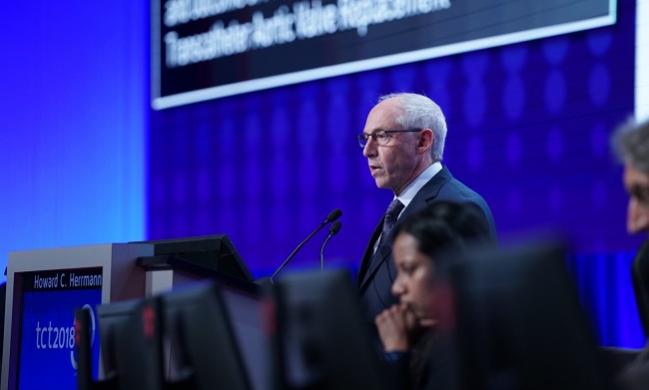Higher Risk of Rehospitalization, Mortality in TAVR Patients With Severe Device Mismatch
Operators should keep predictors of severe patient-prosthesis mismatch in mind when performing TAVR, experts agree.

SAN DIEGO, CA—Over one third of patients who undergo TAVR will have prosthesis-patient mismatch (PPM), with severe cases resulting in higher rehospitalization and mortality rates, according to a new observational study.
“Our findings suggest that efforts should be made to identify and limit the risk for PPM after TAVR,” said Howard Herrmann, MD (Hospital of the University of Pennsylvania, Philadelphia, PA), who presented the results during a late-breaking trial session yesterday at TCT 2018. The study was published simultaneously in the Journal of the American College of Cardiology.
While many studies have analyzed PPM after surgical aortic valve replacement, Herrmann et al say, PPM after TAVR has been investigated in smaller trials with limited follow-up. This study had a larger patient population; the investigators pulled data from the Society of Thoracic Surgeons/American College of Cardiology (STS/ACC) TVT Registry to identify 62,125 TAVR patients enrolled between 2014 and 2017. They accessed the predictors and incidence of PPM, as well as heart failure rehospitalization and mortality after 1 year.
In all, 12% of patients in the study had severe PPM (effective orifice area index [EOAI] < 0.65 cm2/m2), while an additional 24% had moderate PPM (EOAI 0.65-0.85 cm2/m2). Major predictors of PPM included a valve-in-valve procedure (OR 2.78; 95% CI 2.53-3.04) and a valve prosthesis under 23 mm in diameter (OR 2.77, 95% CI 2.59-2.97). Larger body surface area (OR 1.71; 95% CI 1.66-1.77), female sex (OR 1.46 95% CI 1.35-1.58), and nonwhite/Hispanic race (0R 1.23, 95% CI 1.13-1.35) were also tied to higher risk of severe PPM.
Patients with severe PPM fared worse that patients with moderate to no PPM. Patients with severe PPM showed higher rates of mortality (HR 1.19; 95% CI 1.09-1.31) and heart failure rehospitalization (HR 1.12; 95% CI 1.02-1.24) after 1 year. There was no association between PPM and stroke.
These findings are not particularly surprising, said Martin B. Leon, MD (NewYork-Presbyterian/Columbia University Irving Medical Center, New York, NY), who commented on the study in a press conference Sunday morning. “I think we’ve known for a long time that severe PPM is certainly an issue that affects outcomes. It has been less clear in the TAVR literature, and I think you need a study of this robustness and size to be able to demonstrate that.”
Increased Attention Needed
Having identified PPM as a relatively common complication with TAVR procedures, but the next step is developing a protocol for preventing PPM in the future, Herrmann said in the press conference. “Awareness is really a first step in trying to fix it,” he said. “We spend a lot of time in the heart team meetings looking at CT scans for annular dimension and better vascular access but really don’t really talk too much about severe PPM or the risk of that. I think this [study] allows us to start predicting on patient factors and what prosthesis we might be using for a patient.”
To avoid PPM, surgeons should also consider the type and size of the prosthesis used, Leon agreed, to optimize the effective orifice area. “Hemodynamics matter, to the extent that if we get larger valves in and better results from those valves, it will reduce the frequency of PPM,” Leon said. “That’s something as operators that we might not spend as much time focusing on. I think this will refocus our attention in trying to prevent PPM and be more diligent in terms of prosthesis choice.”
Lucy Hicks is the 2018 recipient of the Jason Kahn Fellowship in Medical Journalism. She is currently a master’s student…
Read Full BioSources
Herrmann, H, Daneshvar, S, Fonarow, G et al. Prosthesis-patient mismatch in 62,125 patients following transcatheter aortic valve replacement: from the STS/ACC TVT Registry. J Am Coll Cardiol. 2018;Epub ahead of print.
Disclosures
- Herrmann reports institutional research funding from Abbott Vascular, Bayer, Boston Scientific, Edwards Lifesciences, Medtronic, and St Jude Medical and consulting for Edwards Lifesciences, Medtronic, and Siemens Healthineers.


Comments